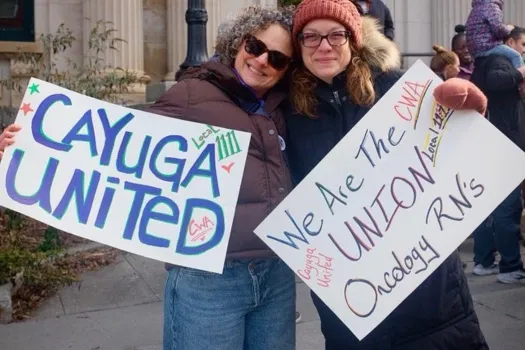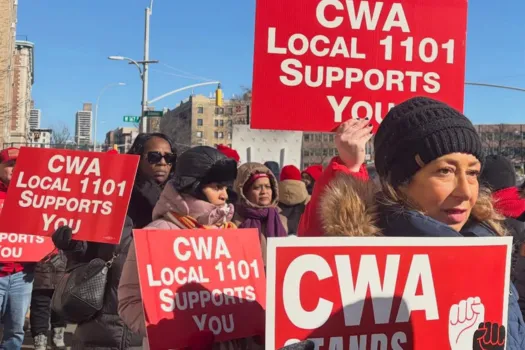Despite $4.2B in Profits in Last 3 Months, Verizon Wants to Destroy Good Jobs
In response to today’s Verizon earnings report, CWA, along with the International Brotherhood of Electrical Workers issued the following statement:
“Yet again, Verizon’s quarterly report shows the strength of the company’s bottom line,” said Bob Master, Assistant to the Vice President, CWA – District 1. “But despite another almost $1.5 billion dollars a month in profits, Verizon continues to ignore millions of consumers who want its high-speed network in both cities and rural areas. At the same time, the company turns its back on its workers, demanding the right to ship even more family-supporting jobs overseas. Verizon should stop stalling and negotiate a fair contract.”
Background:
On October 20, Verizon reported profits of $4.2 billion in 3Q 2015 on revenues of $33.2 billion. This is on top of $8.6 billion in the first half of 2015. The company also reported that during the first nine months of 2015 it has paid out nearly $6.4 billion to shareholders in dividends and stock buybacks.
In recent weeks, 13 Northeastern Mayors and the Democratic candidate for Mayor of Philadelphia sent a letter to Verizon expressing anger at Verizon’s refusal to build its high-speed FiOS network at all in some cities while in others the company fails to meet contractual and legal requirements to complete universal build-outs. The Mayors also expressed concern about Verizon’s treatment of its workforce in ongoing contract negotiations.
The anger has been growing across the East Coast as Verizon systematically refuses to invest in its infrastructure. In a letter to the FCC it admitted that it had only spent $200 million or $3.50 per customer over the last seven years to maintain its copper landline network in eleven states and the District of Columbia. The Communications Workers of America filed letters in six states and Washington, DC calling on them to investigate whether Verizon was neglecting its responsibility.
CWA and IBEW represent 39,000 workers who build, maintain, service and install FiOS and the telephone network, Verizon has not significantly moved off its outrageous initial bargaining demands, made on June 22nd, which include the following proposals:
- Completely eliminating job security and gaining the right to transfer workers at will anywhere in the company’s footprint.
- Increasing workers’ health care costs by thousands of dollars per person, despite the fact that negotiations in 2011-2012 have cut the company’s health care costs by tens of millions of dollars over the life of the past contract.
- Removing restrictions on the company’s right to contract out and offshore union jobs. This comes on top of Verizon’s outsourcing of thousands of jobs in recent years.
- Slashing retirement security.
- Reducing overtime and differential payments.
- Drastically changing the Family Leave Care plan, which provides unpaid leave to care for sick family members or care for a newborn.
- Eliminating the Accident Disability Plan, which provides benefits to workers injured on the job.
At Verizon Wireless, CWA represents about 100 long-time unionized technicians in New York State and 75 retail employees in Brooklyn and Everett, MA. The 65 Brooklyn workers, who are primarily African-American, are the first retail workers to form a union in Verizon Wireless and are seeking a fair first contract. Management is refusing to offer any raises, benefits or improvements to working conditions at the bargaining table for the Brooklyn workers (and also newly-unionized Everett, Massachusetts workers). Verizon Wireless also recently violated workers’ rights by firing their leader, Bianca Cunningham, in order to intimidate the other workers. CWA has filed charges at the National Labor Relations Board and is confident that the charges will be upheld. Any improvements for the newly-union retail workers would set a precedent for the entire company. Verizon Wireless is also refusing to offer fair raises, benefit increases or other improvements for its long-time union technicians, who are now working without a contract.
From the Desk of the Vice President of CWA District 1
“The hard work is just starting, but nurses are good at hard work”: Cayuga Medical Center Nurses Vote to Join CWA!
Largest Nurses Strike in NYC History: CWA Stands with NYSNA!

